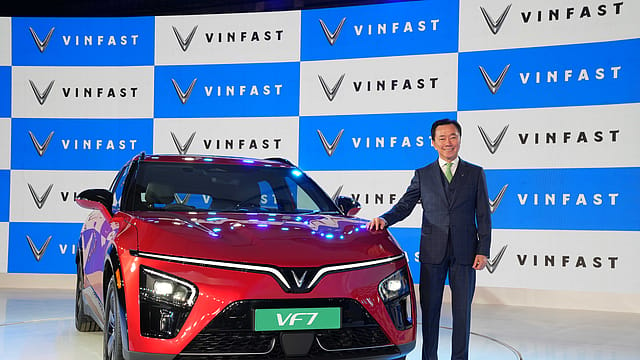VinFast rolls into Indian market, launches electric SUVs VF6 and VF7
ADVERTISEMENT

Nasdaq-listed Vietnamese carmaker VinFast debuted in the Indian market by launching its premium electric sport utility vehicles (SUVs), the VF6 and the VF7, priced starting from ₹16.49 lakh (ex-showroom) and ₹20.89 lakh, respectively.
VinFast, which currently assembles completely knocked-down (CKD) kits at its Thoothukudi plant in Tamil Nadu, is taking a top-down approach for its EVs in India.
After launching its flagship VF7 and VF6, the carmaker plans to launch a new model every six months, including its most affordable model, the VF3.
VinFast has already invested ₹2,000 crore in India out of ₹4,000 crore committed over the next 2-3 years, Pham Sanh Chau, CEO of VinFast Asia, said.
“Our current capacity at Thoothukudi is 50,000 units annually. We are ready to move to the second phase of 150,000 units. The third phase will be 300,000 units,” said Chau.
VinFast plans to open 35 showrooms in 27 cities. “India remains a price-sensitive market. We are investing in India for the long term,” said Chau.
Despite making these investments, VinFast doesn’t qualify for the government’s recently notified Scheme to Promote Manufacturing of Electric Passenger Cars in India (SPMEPCI).
“This scheme was drafted when we were considering entering India. And now our car just rolled out from the Indian factory and that policy just completed. There is a lag. We are no more qualified. That policy is only attracting new foreign investors. We invested already here. It should have included VinFast’s investment. We came in 2024. From the moment we came in, we expressed interest in the policy,” said Chau.
“The process of policymaking does not match the speed with which companies are investing in India,” said the VinFast Asia CEO. “Companies move much faster,” he said, suggesting that the government should consider VinFast’s investment and encourage existing investors to continue to invest in India.
Unlike other OEMs, which import completely built-up units (CBUs) initially to test the market, Vinfast decided to construct its factory in India first, said Chau.
VinFast has come here with the whole ecosystem and not just to sell the cars but to build the ecosystem for the Vingroup as well, he said. “Vinfast is just a part of the ecosystem of Vingroup.”
VinFast also plans to enter the two-wheeler and commercial vehicle space, Chau added. The Vingroup also has plans to build green Smart Cities in India. “We want to build Smart Cities bigger of 2,000 acres where everything is green: e-buses, charging points, e-taxis, and electric two-wheelers among others," Chau said, adding that the Vietnamese conglomerate is in discussions with chief ministers of Andhra Pradesh, Telangana and Tamil Nadu.
The 59.6-kilowatt-hour (kWh) battery pack VF6 offers an ARAI-certified range of up to 468 kilometres, while the same battery pack on VF7 has a claimed range of 438 kms, the company said.